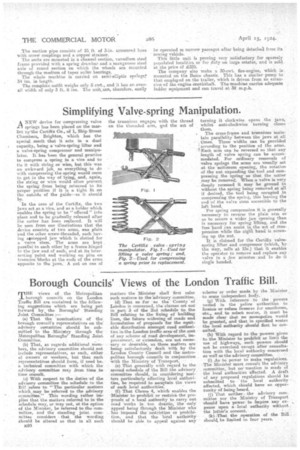Borough Councils' Views of the London Traffic Bill.
Page 20

If you've noticed an error in this article please click here to report it so we can fix it.
THE views of the Metropolitan borough councils on the .London Traffic Bill are contained in the following suggestions which are being put forward by. the Boroughs' Standing Joint Committee :- (a) That the nominations of the borough council's representatives on the advisory committee shocild be submitted 'to the Ministry through the. Metropolitan Boroughs' Standing Joint
Committee. •
(h) That, as regards additional members, the advisory committee should not include representatives, as such, either of owners or workers, but that such representatives should form, if need be. a technical committee with which the advisory committee may from time to time 0011S131t.
(o) With respect to the duties of the advisory committee the schedule -to theBill 'melees -to ." The particular matters 'which ay be referred to the advisory committee." This wcircling rather implies that the matters referred to in the schedule, may, or may not, at the option of the Minister, he referred to the committee, and the standing joint committee considers that the wording should be altered so that in all such
E20
matters the Minister shall first refer such mailers to the advisory committee. (d) That so .fax as the County of Londou is concerned, the clauses set out in pert .3 of the 2nd s deed* to the Bill xellaiiing to the fixing of building lines, the future widening of roads and formadaitrion proposals liar the equitable distribution amongst -road outlet:eaties in the London traffic area of the cost of any scheme of read development, iinprovement, or extemacin, are not tleCeSsary or desirable, as these matters are being satisfactorily dealt with by the London County Council,and the metropolitan borough councils in conjunction with the Ministry'of Transport. (e) That generally with regard to the second soliedule of the Bill the advisory committee should, in considering mat-. tars particularly affecting local authorities, be required to asoeptain the views -a earth local authorities.
i(f) That Clause 4, which enables the .1011inister to prohibit. or restrict-the proposals of a local authority to carry out, read works istoo drastic, the -only appeal being through the Minister who has the restriction or prohibition, and that the local authority should be able to appeal against any
scheme or order made by the Minister. to some independent body.' (g) With reference to the powers vested in the police authorities to .lioance .or 'refnee licences for omnibuses, etc,., and to select routes, it must he made -dear that no monopolies would 'be granted, and that in specified mutes the local aintila.erilly should first be consulted.
fl) With regard to the powers given to the Minister to prohibit or limit the
nse of highways, imoli powers -should not be exercised except after consultation with the local authority -concerned as well as the advisory committee.
(1) As to power to make regulations. -The Minister must consult the advisory committee, but no' mention is made of the local authorities affected. A draft of any proposed regulations should be submitted th the local authority affected, -which shbuld hare an opportunity of .being heard. (j) That neither . the advisory cora-mittee nor the Ministry of Transport
'should have 'power to impose any expense upon alocal authority without
the latter's consent.
RI) That the operation of the Bill. should, be limited to four years.






























